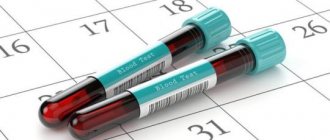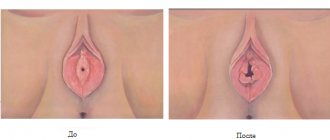Menstrual cycle disorders are clearly manifested. The main symptom is delays or, conversely, premature onset of menstruation. Drugs for menstrual irregularities are selected on an individual basis. The doctor recommends that you undergo a comprehensive diagnostic test first. This is necessary to establish the cause of the violation. Stressful situations, physical activity, poor nutrition, and past illnesses can provoke deviations. Cycle disruption cannot be ignored, as complications will develop. When using any medications, it is important to follow the instructions.
There can be many reasons for cycle disruption
Normal menstruation and types of deviations
The menstrual cycle lasts 21-35 days. For many women it is 28-30 days. The beginning of each subsequent monthly period is conventionally considered to be menstruation (bloody discharge). Normally, their duration should be 3-5 days. Signs of normal menstruation:
- volume of discharge – no more than 250 ml for the entire period;
- color – red (may be brown on the first and last day);
- consistency – liquid discharge mass with small clots of dried blood and mucus;
- no pungent or unpleasant odor;
- associated discomfort in the abdomen and lower back.
An increase in the duration of bleeding, increased intensity, and scanty menstruation are signs of abnormalities. The table describes the types of menstrual disorders.
| Estimated parameter | Nature of changes | Type of deviation |
| Number of allocations per period | More than 400 ml | Hypermenorrhea |
| Less than 50 ml | Hypomenorrhea | |
| Duration | More than 5-7 days | Polymenorrhea |
| Less than 3 days | Oligomenorrhea | |
| Feel | Intense pain, the appearance of additional unpleasant symptoms (vomiting, diarrhea, changes in blood pressure) | Algomenorrhea |
| Periodicity | Absence for more than six months | Amenorrhea |
| Appears during the intermenstrual period | Metrorrhagia | |
| Total number of days of the cycle | More than 35 days | Opsomenorrhea |
| Less than 21 days | Proyomenorrhea |
Causes of menstrual irregularities
The menstrual cycle depends on various physiological processes that occur in the female body. The main causes of irregular menstruation:
- hormonal imbalances;
- inflammatory pathologies of the genitourinary system;
- climate change;
- changing your daily routine;
- lack of vitamins and microelements;
- taking medications;
- termination of pregnancy (miscarriage, abortion);
- physical exercise;
- psychological stress;
- sudden change in body weight;
- diseases of the endocrine system;
- exacerbation of chronic pathologies;
- age-related changes.
What methods are used for recovery?
Here everything will depend on the factor that caused the violation. If these are inflammations or infections, they need to be eliminated, for which medications are prescribed, after a course of treatment with which, as a rule, the menstrual cycle normalizes itself.
The cycle may be disrupted if a neoplasm occurs. In this case, a course of hormonal medications is prescribed, in the same way as in case of hormonal disorders under the influence of any external factors. A restorative course of treatment can only be prescribed by a doctor, and only after diagnosis. Surgery may be required to remove tumors.
If disorders are caused by poor nutrition, it is necessary to review the diet and make it balanced. To facilitate the transition to menopause, when the cycle becomes irregular and unpleasant symptoms occur, a course of hormone replacement therapy is prescribed.
Methods for diagnosing disorders
First of all, the doctor will interview the patient and take an anamnesis. The specialist will be interested in events preceding the deviation, accompanying symptoms, etc. It is also important for the doctor to know about previous pregnancies.
Then the gynecologist will conduct a gynecological examination and take biomaterial for laboratory tests (smear for microflora and cytology). It is also necessary to take blood tests (for hormones, sexually transmitted infections, coagulation, general clinical analysis).
For a detailed examination of the uterus and to identify disorders in follicle maturation, an ultrasound scan of the pelvic organs is performed. In some cases, it is necessary to exclude pathological processes in the pituitary gland, so the woman may be referred for an MRI.
Reasons for lack of menstruation
If your periods have disappeared, first of all, it is necessary to establish the exact cause of this phenomenon. There are many reasons that can cause amenorrhea.
- Lack of menstruation can be caused by intense physical activity.
- This phenomenon may be a consequence of inflammatory processes in the pelvic organs or an infection transmitted through unprotected sexual intercourse.
- Amenorrhea can be caused by a disease of the endocrine system.
- Frequent stress and moving to a different climate zone can also negatively affect the regularity of menstruation.
- The absence of menstruation can be caused by pathology of the genital organs.
- Amenorrhea may indicate pregnancy or postmenopause.
Therefore, it is very important to consult a doctor who will conduct an examination and rule out the presence of internal diseases. If amenorrhea is caused by a deficiency of vitamins and nutrients, you can think about how to restore menstruation after a grueling diet.
Hormonal therapy to restore the cycle
The main mechanism for regulating the cyclicity of menstruation is female sex hormones (progesterone and estrogens). When their concentration increases or decreases in the body, a hormonal imbalance occurs, leading to menstruation irregularities. To restore the cycle, women are prescribed medications that contain synthetic analogues of hormones.
Duphaston, Utrozhestan, Progesterone
Duphaston, Progesterone and Utrozhestan are on the list of the best hormonal drugs (we recommend reading: how to treat hormonal imbalance with Duphaston?). The main component of drugs is progesterone, obtained by various methods. These drugs are prescribed for abnormalities in the menstrual cycle caused by insufficient levels of the hormone in the body. The dosage and duration of drug treatment is determined directly by the doctor, depending on the patient’s diagnosis. The table describes the main characteristics of Duphaston, Utrozhestan and Progesterone.
| Name | Description of the active substance | Release form |
| Progesterone | Corpus luteum hormone of animal origin | Tablets, capsules, injection ampoules, gel for external use |
| Utrozhestan | Progesterone derived from plant sources | Capsules of various shapes, 100 and 200 mg |
| Duphaston | Dydrogesterone is a synthetic progestogen | Pills |
Divitren, Cliogest, Cyclo-Proginova
Divitren, Cliogest and Cyclo-Proginova are drugs that contain 2 main components (derivatives of estrogen and progesterone). These medications are prescribed to women if the cyclicity of menstruation is disrupted due to lack of ovulation due to a lack of estrogen. The tablets speed up the restoration of the menstrual cycle and reduce the symptoms associated with menopause. Descriptions of medicines are presented in the table.
| Name | Main components | Peculiarities |
| Divitren | Estradiol, Medroxyprogesterone | The blister pack with a calendar scale contains 3 types of tablets with different compositions to simulate the hormonal activity that is characteristic of the menstrual cycle |
| Cliogest | Estradiol, norethisterone acetate | Monophasic drug |
| Cyclo-Proginova | Estradiol valerate, norgestrel | The drug consists of 2 types of tablets, which are taken depending on the day of the cycle |
Traditional medicine
Many experts believe that it is impossible to restore the cyclicity of the regulation using traditional medicine alone. However, doctors recognize the effectiveness of traditional methods as additional ways to normalize the cycle.
Help restore the menstrual cycle:
- Infusions of fennel, St. John's wort, wormwood, rose hips, parsley seeds. Used for amenorrhea. Drink 200 ml of liquid daily for 60-90 days.
- Decoctions of oak bark and yarrow (for polymenorrhea). To achieve results, you need to drink 400 ml of decoction from the 3rd day of menstruation until its end.
A decoction of cornflower flowers also helps to normalize an irregular cycle, and if there is a delay, an infusion of oregano is used (1 tablespoon of herb per glass of boiling water).
Vitamin and mineral complexes for cycle restoration
The functioning of the organs of the reproductive system is influenced by various vitamins and minerals. For example, vitamin B12 and ascorbic acid stimulate uterine contractility, vitamin E promotes the production of female hormones.
To prevent the occurrence of menstrual irregularities, women are recommended to take vitamin complexes containing, in addition to the indicated elements, vitamins C and A. Also, to eliminate menstrual irregularities, the complexes Cyclovita, Time Factor, Lady's Formula are used (we recommend reading: indications for the use of the drug "Time Factor" and its side effects).
Missed your period - what to do?
In fact, this is a serious symptom that should alert a woman, since the cause may be hidden in various diseases. First of all, you need to check the pelvic organs for infections. It is also important to undergo an ultrasound to exclude tumors and cysts.
If a tumor is detected, the dynamics of its development should be regularly monitored. In addition, it would not be superfluous to examine the internal organs and brain.
If after the examination the reason for the disappearance of menstruation is not identified, then you need to remember what medications you took recently, perhaps they had such side effects.
Set of preventive measures
How can you prevent menstrual irregularities? First of all, a woman should be attentive to her own health, regularly visit a gynecologist and refuse self-medication. There will be no disruptions in the menstrual cycle if you follow the following recommendations:
- Healthy food;
- control physical activity;
- have sex regularly;
- if possible, reduce the influence of stress factors;
- stop smoking, coffee, alcohol;
- rest;
- observe the drinking regime.
Many years of clinical observation experience show that menstruation failure can occur in almost every girl and woman of reproductive age. Therefore, many of them are quite naturally concerned about the question of how to normalize the menstrual cycle. Currently, in parallel with traditional medicine, alternative treatment methods based on the use of all kinds of folk remedies are flourishing.
Without eliminating the cause of the menstrual cycle disorder, menstrual irregularities will continue.
Prevention of menstrual irregularities
Any problems with the cycle and menstruation are easier to prevent than to treat. Compliance with certain rules is the best prevention of any gynecological problems:
- Organization of balanced nutrition.
- Normal sleep.
- Daily physical activity.
- Avoiding severe stress.
- Rejection of bad habits.
- Regular sex life.
- Systematic visit to the gynecologist.
When menstrual irregularities occur, it is necessary to correctly determine the cause of the cycle disturbance in order for treatment to be effective. You cannot be guided only by information from the Internet when prescribing medications for yourself, since the diagnosis of the disease is carried out on the basis of test results.
The problem may be hidden in lifestyle changes and may not require therapy at all, however, there are often cases when there is a need to take potent hemostatic drugs or hormonal pills to restore the menstrual cycle.
A person without a medical education will not be able to independently determine the advisability of using a particular substance and its dosage, so it is important to follow only the doctor’s instructions and discuss with him any changes in taking medications.
The menstrual cycle is an important indicator of women's health; normally, periods should be regular. If there is a disruption in the menstrual cycle, women try to understand the causes of the disruption and improve the functioning of the body. How to restore menstruation? What drugs and folk remedies are most effective?
Traditional treatment
If you experience problems with the menstrual cycle, you must visit a gynecologist who, if necessary, will conduct a comprehensive clinical examination and prescribe appropriate treatment. What medications can be used to normalize the cycle:
Cyclodinone
A popular herbal medicine that can normalize the level of female sex hormones is Cyclodinone. The main pharmacological effect is associated with a decrease in prolactin production. It is reliably known that if there is a high level of prolactin, this affects the secretion of gonadotropic hormones, leading to an imbalance between progesterone and estrogen. This results in disruptions in the menstrual cycle and the appearance of painful sensations in the mammary glands (mastodynia), requiring adequate treatment.
By reducing the concentration of prolactin, Cyclodinone helps not only normalize menstruation, but also eliminate the pathological process in the mammary gland and relieve pain. In addition, the production of gonadotropic hormones is established. Based on the above, we can conclude that the main indications for the use of Cyclodinone will be:
- Menstrual disorder.
- Severe premenstrual syndrome.
- Painful sensations in the chest (mastodynia).
The only contraindications that should be noted are hypersensitivity to the components of the drug. Undesirable side effects are extremely rare. Isolated cases of the development of an allergic reaction (skin rashes, urticaria, itching, etc.), emotional agitation, confusion and hallucinatory states have been recorded. The duration of the therapeutic course is usually about 80–90 days. However, even after the cessation of clinical symptoms, it is recommended to continue treatment for several more weeks.
Despite the presence of lactose in the drug, there are no restrictions on the use of these medications by patients suffering from any form of diabetes. Buy pills to normalize your cycle at the pharmacy for about 450–480 rubles. The most famous analogue of Cylodinone is Agnukaston.
Taking medications to normalize the menstrual cycle should be agreed with a medical specialist.
Dysmenorm
One of the representatives of homeopathic medicines that normalize menstruation in girls and women of reproductive age is Dismenorm. As a rule, it is used in complex treatment for functional disorders of the menstrual cycle. It can also be used for premenstrual syndrome and painful menstruation. Dysmenorm is quite often prescribed if there are contraindications to hormonal treatment with drugs containing estrogens. According to clinical experience, most patients tolerate this medicine well.
The therapeutic course is quite long. The homeopathic remedy should be taken every day for at least three months.
The drug should not be taken by patients who are allergic to bee venom and lactose intolerant. If pregnancy occurs, the use of Dismenorm must be suspended. There is no information about cases of overdose. This medicine is available in pharmacies without a doctor's prescription. Homeopathic tablets, made in Germany, to normalize menstruation can be purchased at a price of 430–460 rubles per pack.
If hormonal imbalance is not treated, it can result in serious pathology and even infertility.
Cyclovita
Even without being a traditional medicine, but just a dietary supplement, Cyclovita is successfully used for various disorders of menstrual function. Repeated clinical studies have proven that a chronic lack of vitamins and minerals inevitably leads to pathological conditions in the reproductive system. At the same time, the optimal supply of these essential substances ensures the normalization of its work.
Cyclic vitamin and mineral therapy has found wide application in gynecological and obstetric practice. The basic principle is that at each phase of the cycle certain vitamins and minerals are prescribed, which have a beneficial effect on a woman’s hormonal balance. As an element of complex treatment, Cyclovita is often used for problems of the reproductive system such as:
- Irregular periods.
- Painful menstruation.
- Premenstrual syndrome.
- Discomfortable sensations in the mammary glands (engorgement, soreness, etc.).
The biological supplement Cyclovit includes two types of tablets, each of which must be taken at a certain phase of the cycle. Additional intake of vitamins and minerals is also especially useful for women in the following situations:
- High physical and psycho-emotional stress.
- Before menstruation.
- After gynecological diseases.
- Long-term use of hormonal contraceptives.
If the vitamin-mineral complex Cyclovit is used for at least 3 months, then many positive effects are observed, including a decrease in the clinical manifestations of premenstrual syndrome, normalization of the psycho-emotional sphere, restoration of the regularity of the menstrual cycle, and improvement of skin condition. A package of Cyclovit tablets costs approximately 1200–1300 rubles. Before purchasing a dietary supplement, be sure to consult a specialist.
Duphaston
Hormonal drugs that normalize the menstrual cycle include Duphaston. The active ingredient of the drug is dydrogesterone, which determines all its pharmacological properties. What are the indications for its use:
- Irregular and/or painful periods.
- Bleeding from the uterus of a dysfunctional nature.
- Premenstrual syndrome.
- Progesterone deficiency.
- Infertility associated with luteal phase disturbance.
- Endometriosis.
Treatment: basic drugs to normalize menstruation
Drugs for normalizing the menstrual cycle are usually divided into the following categories:
- Hormonal pills, contraceptives.
- Alternative medicine (homeopathy).
- Means for increasing blood clotting (hemostatics).
- Complexes with vitamins and minerals.
- Substances to increase the tone and contractile activity of intimate muscles (uterotonics).
- Sedatives.
- Painkillers, antispasmodics.
Treatment of menstrual disorders can be based on several drugs at once. The choice of medication will depend on the stage, type of disorder, as well as the general health characteristics of the patient.
Algomenorrhea
Painful periods can be caused by many reasons. Therefore, therapy is most often complex. Treatment may include the following drugs:
Prostaglandin synthesis inhibitors
Reduce muscle spasms and also have an analgesic effect:
Combined contraceptives
Estrogen-gestagen tablets should be taken from the 5th to the 25th day of the cycle, one tablet for at least three months:
Read about the features of menstruation when taking Jess by following the link.
Additional treatment
Doctors also assign a significant role in eliminating severe pain to various vitamin and mineral complexes. But the main thing remains proper sleep, a balanced diet and optimal physical activity.
Amenorrhea
Absence of menstruation for six months or longer can be eliminated with various medications.
The basis of treatment is hormone replacement therapy. Additionally, sedatives and homeopathic tablets are used. But sometimes it is impossible to do without surgical intervention.
Estrogens
To eliminate endocrine disruptions associated with ovarian function, as well as delayed puberty:
Progestins
Most often prescribed for secondary amenorrhea:
Find out how Duphaston is used to induce menstruation on our website.
Additional treatments include:
- combined OK (Diane, Janine);
- herbal medicines (Remens, Mastodinon);
- means for ovarian hyperstimulation.
Unconventional treatment
Today, folk remedies for menstrual disorders are especially popular among women. Most doctors are familiar with various traditional medicine recipes. Often, gynecologists resort to such medications if necessary and appropriate. Let's look at the most effective recipes:
- For a short cycle, use a herbal infusion. To prepare it, take a tablespoon of clapper grass (or common gum) and shepherd's purse. Infuse in a glass of boiling water for about an hour. Strain and drink 40 ml up to 6 times a day. Take the healing potion for 5 days (when there are no periods) and for the same amount of time as your cycle lags behind normal.
Treatment with folk remedies for menstrual disorders can be used as an addition to the main therapeutic course, but only if your doctor is not against it.
How to restore menstruation using hormonal drugs
In some situations, the gynecologist prescribes a course of contraceptives. These drugs are used to restore the cycle, because they contain all the necessary vitamins that help normalize menstruation. There are also two medical products for restoring menstruation, containing all the beneficial hormones necessary for the female body:
- Utrozhenstan - prescribed for progesterone deficiency. Consumed 3 times a day, 1 tablet. This medication should be used exclusively on certain days of the menstrual cycle, recommended by a specialist.
- Duphaston is prescribed when menstruation is delayed for more than 5 days and there is no pregnancy. The medication causes menstruation in the shortest possible time. The medicine must be used on certain dates of the menstrual cycle, indicated by the gynecologist. You need to consume Duphaston 1-2 times a day, one tablet.
- Pregnoton - used when there is a large amount of prolactin. The increase in this hormone is associated with excessive nervous tension. A bag of medicinal powder should be diluted in a glass of warm water, mixed thoroughly until completely dissolved and drunk with meals. It is recommended to consume the medication no more than once a day for three months.
Recommendations for normalizing your cycle
It has been scientifically proven that menstrual irregularities can be not only functional, but also associated with serious gynecological pathology. A specialist doctor must determine the true cause of the problem with the reproductive system and prescribe appropriate treatment. However, we can list general recommendations that will help with functional disorders. How can you normalize the menstrual cycle without hormonal medications:
Only a doctor can give the most correct recommendations after conducting a comprehensive examination of the patient.
Gynecologists allow fluctuations in the frequency of the onset of critical days for up to one week. This is a completely normal condition for young girls who are just starting their menstrual cycle, and for mature women of premenopausal age, who are already subject to the processes of extinction of ovarian function and their involution.
It’s another matter when a middle-aged woman has no stable periodicity of menstruation for six months or more. In this case, we can talk about some pathology of the gonads and regulatory mechanisms, hormonal imbalances. To treat such conditions, there are pills to normalize the menstrual cycle.
Basic Rules
Any serious disorder of the menstrual cycle requires qualified assistance from an experienced gynecologist. Self-medication is prohibited, because the reproductive system, in addition to its main function, controls many general processes in a woman’s body, affecting her general well-being and mood. It is also impossible to ignore such a pathological condition, because possible consequences and complications can seriously reduce the quality of life and daily activities.
After diagnostic procedures, including examination, palpation of the internal genital organs, laboratory analysis of a vaginal smear, as well as an ultrasound examination of the pelvic organs, the gynecologist will determine the cause of menstrual irregularities and prescribe appropriate medications that can restore the frequency of the onset of menstrual periods.
Treatment of menstrual irregularities involves the use of hormonal drugs, vitamins and traditional medicine. In advanced cases, several courses of drug therapy may be required.
The main criterion for the use of a particular drug is to establish the cause of the development of the disorder under study. Failures in the onset of menstruation can occur:
- due to pregnancy and lactation, that is, as a result of natural changes in hormonal levels. This option is physiological and does not require adjustment with the help of pharmaceuticals;
- proximity of menopause and menopause. In this case, doctors (gynecologist and endocrinologist) together can prescribe hormone replacement therapy that can alleviate the symptoms of premenopausal cycle disorders caused by hormonal changes in the body;
- urogenital infection. Laboratory diagnostics are required to identify the pathogen. After this procedure, the doctor will prescribe adequate therapy with antibiotics, antimycotics or antiviral agents, depending on the type of pathogenic microorganism;
- pathologies of the hypothalamus, pituitary gland, adrenal glands and thyroid gland. Possible disruption of regulatory mechanisms, hypoproduction of releasing factors and tropic hormones. This option requires consultation with an endocrinologist;
- hormonal disorders due to the use of synthetic hormones, including oral contraceptives. In this case, it is necessary to discontinue the drug, replace it or adjust the dosage;
- ENT diseases. Acute respiratory infections, acute respiratory viral infections, tonsillitis and influenza can also cause menstrual irregularities. For a similar reason, everything will return to normal by itself after the acute phase of the infectious disease;
- psycho-emotional stress. In this case, medication is also not required. After adaptation, the cycle will return to normal.
Why do violations occur?
Before prescribing treatment for menstrual irregularities, the doctor carries out a number of diagnostic measures and establishes the cause of such an imbalance. The following symptoms require mandatory medical attention:
- during menstruation, severe pain, discomfort, cramping pain, digestive disorders and vomiting are felt;
- prolonged absence of menstruation (from six months);
- too scanty menstruation, during which no more than 50 ml of discharge comes out;
- very heavy periods, in which the volume of discharge exceeds 200 ml;
- if menstruation turns into uterine bleeding for an unknown reason;
- long duration of the menstrual cycle in combination with poor regulation, lasting up to 3 days;
- if the duration of the cycle has increased, but the nature of the discharge has not changed;
- if the cycle is too short, less than 21 days;
- if menstrual flow lasts for more than a week.
Such symptoms are not normal for a healthy female body and require medical intervention. The following pathologies and conditions can cause irregularities in the menstrual cycle:
- hormonal imbalance caused by changes in the functioning of the pituitary gland, adrenal glands or ovaries, which produce hormones on which the normal course of the menstrual cycle depends;
- avitaminosis;
- anemia;
- psycho-emotional disorders that affect metabolic processes and the functioning of the endocrine system;
- abnormalities in the development of the genital organs, inflammatory and infectious diseases of the reproductive system;
- malignant and benign neoplasms in the breast or uterus, cysts in the ovaries, etc.
By restoring the cycle on her own, a woman risks causing even more harm to her body, so in case of any irregularities in menstruation, you should immediately seek help from a specialist. The gynecologist will conduct a number of diagnostic procedures, including blood tests for hormones, smears for flora, ultrasound of the pelvic organs, etc. After making an accurate diagnosis, adequate treatment will be prescribed, which will normalize the cycle in a matter of minutes.
Drugs
To restore the cycle, a wide range of hormonal drugs are used. Among the means of drug correction of the frequency of critical days, the most popular are:
Cyclodinone
This is a herbal medicine that can normalize the frequency of menstruation. The pharmacological effect of the drug is to reduce the activity of the hormone prolactin, whose overproduction disrupts the natural balance of progesterone and estrogens. This causes failures in the onset of menstruation, as well as soreness and swelling of the breasts. Accordingly, in addition to normalizing the cycle, Cyclodinone also stops the pathological process in the mammary glands, relieving the woman of pain.
Cyclodinone is a popular drug with minor contraindications and a small number of side effects. They are mainly associated with individual intolerance to the components of the drug. The duration of the course is 2–3 months.
Even after the clinical manifestations go away, it is necessary to take the entire course of tablets. An analogue of the drug in question is Agnukaston.
Dysmenorm
Dysmenorm is a homeopathic remedy. The drug restores the normal cycle in women of fertile age. As a rule, it is used in complex treatment together with other medications. It can be used for severe premenstrual syndrome, as well as pain during menstruation. The drug in question is prescribed for intolerance to drugs containing synthetic hormones, in particular estrogens. It rarely causes side effects.
The duration of the course is 3 months. Dismenorm should be taken every day.
For individual indications, a repeat course may be prescribed. The drug is not recommended for women intolerant to lactose and bee products.
Cyclovita
It is a dietary supplement and can be successfully used to correct the cyclicity of menstruation. Clinical studies have proven that a lack of vitamins, minerals, micro- and macroelements can cause pathological processes in the female reproductive system. Cyclovita is designed to solve the problem of shortage of essential substances.
Taking the drug allows you to relieve and treat conditions such as:
- disruption of the menstrual cycle;
- PMS;
- pain during menstruation;
- pain localized in the mammary glands.
The pharmacological effect of Cyclovita is that it has a beneficial effect on the hormonal balance in the female body, as it is a multivitamin and mineral complex used in various phases of the cycle. Each of them requires the intake of its own set of substances.
Cyclovita can also be used to better cope with psycho-emotional stress, the consequences of gynecological diseases and complications after taking oral contraceptives. The duration of the course is from 1 to 3 months, depending on individual indications.
Duphaston
This is a hormonal drug whose active ingredient is dydrogesterone. The drug is widely used, as it activates restorative processes in the female reproductive system, and also maintains the balance of sex hormones. Indications for the use of Duphaston are:
- Irregularity of the onset of menstruation.
- Uterine bleeding.
- Endometriosis.
- Infertility associated with pathological processes occurring in the luteal phase of the menstrual cycle.
- Progesterone deficiency.
- Premenstrual illness.
The use of the drug is advisable only when progesterone deficiency is detected using laboratory tests. Before prescribing a course, a woman must undergo a comprehensive clinical examination.
Adverse reactions are rare. It is not recommended to prescribe the drug in the presence of pathologies of the cardiovascular system, liver diseases, diabetes mellitus, epilepsy, migraine. The duration of the course and dosage are determined by the attending physician depending on the individual parameters of the woman’s body.
Utrozhestan
In case of irregularities in the frequency of menstruation, it is possible to take the drug Utrozhestan. The decision to prescribe it, like Duphaston, is made after laboratory tests that reveal a deficiency of the hormone progesterone. The drug, in addition to the treatment of hormonal imbalances, is prescribed:
- for benign tumors of the uterus;
- infertility;
- endometriosis;
- as a prevention of premature labor.
The drug has a number of unpleasant side effects, such as:
- manifestation of dysmenorrhea;
- digestive disorders;
- cluster headaches;
- chronic fatigue syndrome;
- depression and depression;
- rash like urticaria.
How do vitamins affect a woman’s body?
It has become popular to divide vitamins into groups “for women”, “for men”, “for children”. What is the secret here and why are people of different ages and genders prescribed certain dietary supplements under this name? There are only 13 of them, but each one triggers a certain biochemical process, thanks to which the body works harmoniously, “like a clock.”
Biochemical processes in women proceed somewhat differently due to their reproductive function (the ability to conceive and bear offspring). For the normal course of monthly cycles, conceiving a child, bearing and feeding a child, you need a full range of vitamins. But the leading role for the fair sex should be given to vitamins B6, B12 and folic acid (B9). These are “reproduction vitamins”, without which menstruation irregularities and problems with childbearing can occur.
The intake rate of folic acid is 400 mcg per day, for pregnant women - 600 mcg. The deficiency of B9, which must be supplied through food, becomes noticeable after 5 days. In women, the consequences of its lack are:
- anemia or decreased number of red blood cells;
- menstrual irregularities;
- infertility;
- problems arising during pregnancy: miscarriage or early birth, placental abruption;
- fetal pathologies.
Note: If there is a sufficient supply of the vitamin, it may be poorly absorbed due to dysbiosis, taking anticonvulsants, barbiturates, using oral contraceptives, or drinking alcohol.
Without vitamin B6 (pyridoxine), a woman gets a whole bunch of problems, and the main one is an imbalance of sex hormones. Their incorrect ratio leads to irritability, stress and depression. It is especially dangerous when such symptoms appear during pregnancy and menopause, causing permenstrual syndrome. Its consumption rate is 1.5-2.8 mg/day.
Vitamin B12 (cobalamin) should be taken by females and with vitamin complexes during menstruation, since blood loss occurs, and Vitamin prevents iron deficiency anemia. It will not hurt during premenstrual syndrome to improve the general condition and relieve nervousness and tension.
Vitamins
Cycle disturbances often occur in the spring-autumn period, that is, a time characterized by hypo- and vitamin deficiency. A lack of nutrients causes disruptions in the functioning of the entire body, in particular in the functioning of the reproductive system. Hormonal imbalance disorders are caused by inhibition of the functions of the main endocrine glands, pituitary gland and ovaries, which do not receive enough vitamins and minerals.
Treatment involves the use of vitamin and mineral complexes. The main ones for a woman during a difficult period will be vitamins E, C, A and B12.
Vitamins C and B12 cause improvements of a non-hormonal nature. Thus, these biologically active substances regulate hemoglobin levels, strengthen blood vessels and stimulate normal uterine contractions during menstruation. Vitamins E and A are involved in the production of female sex hormones: estrogen, progesterone and others.
When there are irregularities in the frequency of menstruation, monovitamins are more often used. In this case, it is easier to control the dosage.
The necessary vitamins for normalizing the cycle can be obtained from food: E and A are found in oils, seeds, nuts, fatty fish, B12 is present in buckwheat, oatmeal, fresh herbs, and C is easily obtained from fruits, strawberries, sorrel and cabbage.










